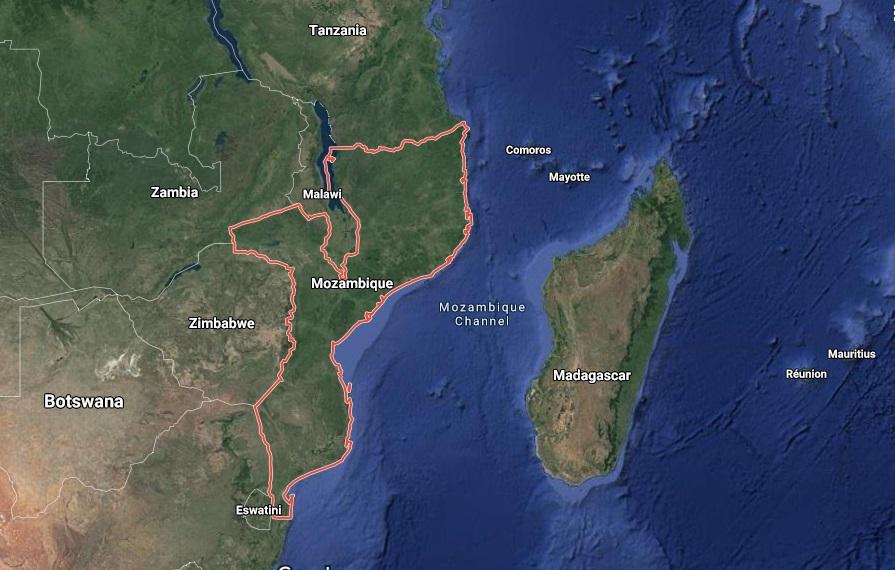
Africa-Press – Mozambique. In this issue
Cabo Delgado
Reconstruction plan gives Maputo power, $
Trade, cashew, training
Other news
Covid-19 low and northern
Court says Chang to US, but Moz appeals
The war
Insurgent attacks and scattered fighting increase
History: Operation Gordian Knot
Cabo Delgado
Reconstruction plan for Cabo Delgado gives control to Maputo and creates slush fund
The Reconstruction Plans For Cabo Delgado approved by the Council of Ministers on 21 September consolidate power in Maputo, leaving little say for people in Cabo Delgado, concludes an investigative article in the October issue of Cabo Ligado Monthly (17 Nov) http://bit.ly/Ligado-Oct21 (also in Portuguese). And the huge variation in budget cost estimates shows that a slush fund is being created.
The reconstruction plan “indicates Maputo’s other priority for Cabo Delgado: re-establishing political control over the province. Ever since the discovery of natural gas in Cabo Delgado, the Mozambican government has worked to consolidate political power over the province in Maputo, a process that only accelerated over the course of the conflict. The reconstruction plan pushes control further into the hands of Mozambique’s president. As the plan makes clear, the lead implementers of the plan at the national level are the Council of Ministers – the president’s cabinet, which serve at his pleasure. At the provincial level, implementation is led by the Provincial Secretary of State, with the Provincial Governor explicitly relegated to an “assistance” role. The distinction is important because, under Mozambique’s recent constitutional reforms, provincial governors are directly elected by citizens of each province, but provincial secretaries of state are appointed by the president. … centralization of implementation allows Frelimo to pursue political consolidation with international partners’ money,” reports Cabo Ligado.
“There is plenty of evidence in the proposed budget for Mocimboa da Praia district that there is slack built into reconstruction expenditures that can be used to line the pockets of political allies.” For example, the district government intends to spend $52 each on 150 photos of the president and national flags to display in and around rebuilt government buildings. Yet the district office of the National Institute of Social Action also sets aside money to buy photographs of the president for its new offices – $94 per photograph.
The budget reports wildly different cost estimates for core supplies that will be necessary to rebuild district governance. Four different district offices will buy tents as temporary housing for the officials. Cost estimates per tent range from $28 for the district central government to $156 for the public health service to $783 for the district office of economic activities. “These kinds of discrepancies do not represent large dollar amounts in the scheme of government corruption, but they are harbingers of the kind of creative budgeting that could fund what amounts to a direct patronage system from the presidency to Cabo Delgado communities. If implemented, such a system could leave Cabo Delgado citizens with even less local control over their political future than they had before the conflict.”
This issue of Cabo Ligado also has good investigative articles on international training, cross border trade, and cashew trade are all subject of investigative articles:
The Dynamics Of Informal Cross-Border Trade Between Cabo Delgado and Mtwara
is a detailed and fascinating report about the legal and informal trade across the Rovuma River which is central to the economy of the zone. Many informal crossings, the formal crossing at the Unity bridge, and coastal boat traffic combine with the war and changing regulations on both sides to create a complex and changing trade pattern. “Traders are adapting their strategies according to the dynamics imposed by the authorities in Mozambique and Tanzania, as well as by the ongoing conflict in the country itself. Informality is also seen as a strategy for obtaining livelihoods in a context where local youth are mostly excluded from the major economic driver in the province: large natural resource extraction projects. Some traders in Palma have reported to Cabo Ligado that due to lack of integration in the district’s natural gas projects, they have chosen to engage in small businesses such as informal sales, moto-taxis, and other less profitable activities.”
The Cashew Trade: A Case Study:
“As recently as 2019, up to half the cashew nut crop from Nangade district was smuggled to Tanzania. A state-managed marketing system in Tanzania provides a higher price for Cabo Delgado cashews than can be obtained in Mozambique, particularly for more isolated producers in the north.”
International Training Programs
is the most complete summary of all of the various military training programmes, and highlights the lack of coordination.
The October issue of Cabo Ligado Monthly is on http://bit.ly/Ligado-Oct21
Other news
Covid-19 low and northern
New cases of Covid-19 have fallen to 50-70 per week with only one death per week. But the big change is regional, with 50% of active cases in Nampula and Cabo Delgado and only 17% in Maputo city and province.
On 24 October President Filipe Nyusi eased some restrictions. A midnight to 4 am curfew is in force. Shops remain open until 20.00. The maximum number of people in private social events, religious services and ceremonies, and concerts varies between 50 and 100. Popular beaches remain closed. And warnings continue of another wave.
Vaccination is determined by availability of vaccines; 3 mn people now are fully vaccinated and 2 mn more have had one dose.
Chronic malnutrition affects 38% of children under five years old in Mozambique,
according to the latest survey by the National Statistics Institute (INE); in 16% of children, malnutrition is very severe. The World Health Organization (WHO) and the United Nations Children’s Fund (UNICEF), classify these levels as “very high”.
People
Former Finance Minister Manuel Chang
is to be extradited to the United State to face trial over the secret debts, a judge in South Africa ruled on 10 November. But Mozambique immediately appealed saying that he should be extradited to Mozambique. So Chang remains in custody in South Africa, where he has been for nearly three years, as the US and Mozambique fight over him.
Manuel Jose, the police killer of musician Max Love,
was sentenced to 20 years in prison on 9 November. However, in the eight years since the 2013 murder at Mayor Manuel de Araújo’s victory celebrations, Jose has been allowed to disappear, and he was tried in absentia.
Matias Guente
, editor of Canal de Moçambique, was awarded this year’s International Press Freedom Prize by the Committee to Protect Journalists on 17 November. Canal has revealed corruption cases involving top government officials and prominent business people. The Canal Maputo office was firebombed in August 2020. Guente won jointly with Belarussian correspondent Katsiaryna Barysevich, Anastasia Mejia from Guatemala, and Aye Chang Niang from Myanmar.
Lara Muave,
marine scientist and prominent environmental activist ,was murdered on 15 October in Maputo. Mozambican Criminal Investigation Service (SERNIC) said that a boyfriend has confessed to her murder. Violence against women remains high in Mozambique.
Erik Prince
continues to search for a place in the region’s wars and gas security, and was a speaker at an African Energy Chamber meeting in Cape Town earlier this month.
The war
Insurgent attacks and scattered fighting increase
Only 100 insurgents have been killed by Rwandan forces, Rwandan ambassador to Mozambique Claude Nikobizanzwe told an Institute for Security Studies (ISS) webinar on 8 November. This means that the insurgents are abandoning their bases in the face of superior forces and are going to ground, and moving in small groups. MediaFax (18 Nov) talks of small groups moving toward Niassa province and Montepuez district. Rhula talks of groups between 4 and 30 insurgents. Troops are having more success pursuing insurgents after an attack.
Rwandan forces control the two key gas districts, Palma and Mocimba da Praia. The Southern African Development Community’s (SADC) Mission in Mozambique’s (SAMIM) is assigned to Mueda and Macomia districts. Both appear to be fighting in Nangade.
There have been increasing insurgent attacks in Mueda, especially near the Rovuma River border with Tanzania. The rains have not yet started and apparently the river is still low and can be crossed.
Rhula (alert 22 Nov) says “in late September, during a presentation to international partners, the Mozambican Prime Minister, Carlos Agostinho do Rosario, stated that the government believes the conflict in Cabo Delgado is in its final stages. However, the recent increase in the insurgent attacks contradicts this sentiment, suggesting that the conflict is far from resolved.”
The map from Rhula Intelligent Solutions (22 Nov) shows 15 insurgent-led incidents in the 10 days 7-17 November. Many seems to be a mix of taking food and burning a few houses.
Mueda district:
Seven of the attacks were in Mueda district, at least 40 km north of Mueda town and close to the Rovuma River. Rhula and Carta de Mocambique report a group of 20 insurgents armed with machetes and firearms attacking Nachitenje village, killing 4 people, looting food products, burning homes and taking several people hostage. On 13 November, a group of insurgents killed a motortaxi driver near Namatil (the village in Mueda District) and stole his vehicle. DW (19 Nov) says villagers near the border reported insurgents trying to flee to Tanzania and a SADC (SAMIM) force attacked; some insurgents and three civilians were killed. Yesterday (21 Nov) a local militia repelled an attack on a road construction camp on the Mueda-Negomano road. (Carta 22 Nov) Carta de Moçambique also reports that more than 100 people have fled the recent fighting and taken refuge in Mueda town.
Nangade district:
Moving east, also near the river, is Nangade district which has been a centre of fighting for more than a year. There were three attacks on the Mueda-Nangade road. On 10 November, insurgents ambushed Rwandan and Mozambican forces at Mualela near the road. Insurgents attacked from various directions suggesting a structured ambush being carried out by the attacking group. However, despite the number of insurgent attacks in Nangade District, the security forces also remain active in the area, and in recent clashes security forces reportedly killed 7 insurgents.
Insurgents attacked Lijungo, 5 km south of Nangade town, on 8 November. Both Mozambican and SAMIM forces mobilized to pursue the attackers. Those troops caught up with the insurgents who werein the forest and killed three of them.
But in Nangade town soldiers and militia members are repeatedly accused of maltreatment of civilians. On 8 November a solider demanded a cigarette from a civilian and beat him unconscious when he refused. (Ikweli 12 Nov) On 30 September a civilian was badly beaten because he did not offer a free drink of the local alcoholic brew. Refugees and Tanzanians are accused of being insurgents and are beaten, local people complain. (Carta de Mocambique 11 Oct)
Palma district:
The only insurgent attack in this Rwandan controlled district was on Ntuleni village in Olumbe, on the coast south of Palma and the Afungi peninsula. They looted food and burned several houses, killing one person. But a combined force of Mozambican and Rwandan soldiers responded, tracking the insurgents with drones. The security forces subsequently caught up with the insurgents, killing 9 members of the attacking group, underlining that the Rwandans are in control there. (Rhula, Carta)
Macomia district
: Dense forest along the Messalo River, which forms part of the border between Mocimboa da Praia and s, provide good cover for guerrillas and their bases. The first attack of the independence war was in Chai, just south of the Messalo and on the main N380 road going north, and this zone has been heavily contested during the current war. SAMIM in a 15 November statement said they had already cleared bases south of the Messalo River and insurgents were fleeing north. In late October they cleared three insurgent bases just north of Lake Nguri. The bases had been abandoned but they left behind weapons and captives – 8 women an 3 children.
On 10 November insurgents attacked 5th Congress village, on the N380 road 12 km south of Chai. SAMIM forces responded and caught up with the insurgents near Chai where there was a battle. Several insurgents were killed. Two days later inside 5th Congress village three alleged insurgents were killed by the local militia. (Rhula, Carta)
But well informed insurgents attacked the village of Najaba/Nambini, just 15 km from Macomia town, on 13 November. Food aid was distributed to the community earlier that day, and insurgents were able to loot a large quantity of that food; 7 villagers were killed.
Quissanga district:
There are reports of fighting in Quissanga, but no details.
Other Cabo Delgado News
A group of district government administrative staff and nurses left Mueda for Mocimboa da Praia
on 10 November, becoming the first group of what is expected to be a larger effort to get district services up and running quickly. “The water and energy systems have already been restored, but some infrastructure is still destroyed. The government is making every effort to restore facilities; we want to ensure that the population returns to acceptable conditions,” declared mayor Cheia Carlos Momba. He is now living in Mocimboa again, after almost a year managing the town from Pemba. (Cabo Ligado 17 Nov, Lusa 22 Nov)
Tanzania’s president said peace has been restored along the border with Mozambique
, and insurgents from Mozambique who have been wreaking havoc in the southern Mtwara villages have been neutralised. This is the first time President Samia Suluhu Hassan has publicly talked about the protracted military operation on the southern border. Dressed in military fatigues, she was addressing military commanders at the Lugalo military base in Dar es Salaam. In the worst attack, more than 300 heavily-armed insurgents, raided Kitaya village on the bank of Rovuma River in October 2020, razing homes, and killing people. (Anadolu Agency 15 Nov)
Is France using “development aid” to finance the intervention of Rwandan troops in Mozambique?
(CDD 21 Nov http://bit.ly/Moz-CDD-France) A detailed look at sharply increased French aid to Rwanda suggests that money is Rwanda’s involvement in the war.
South African soldiers in Macomia suffered from diarrhoea after many days of consuming rotten food and dirty water in their base
. Soldiers told the Durban Daily News (16 Nov) “We are kept and treated like prisoners.” A SA National Defence Force (SANDF) spokesperson told Defenceweb (19 Nov) that a chilled food storage unit “broke down over the period 20 to 24 October” and “consequently” stored rations “were out of required refrigeration temperature” for four days and were “spoilt in the interim”. The local commander was told to buy fruit and vegetables at the local market.
History
Operation Gordian Knot: will history be repeated?
By 1970 the Frelimo guerrillas has established northern Cabo Delgado as a liberated zone. In March 1970 Portugal appointed a new military commander, Brigadier General Kaulza de Arriaga. He had been a ground force commander in Mozambique and studied the war at the Institute of Higher Military Studies in Lisbon. And he visited the United States for consultations with General William Westmoreland concerning US tactics in Vietnam.
His plan was Operation Gordian Knot. The Portuguese used light bombers, helicopters and reinforced ground patrols. They used US tactics of quick helicopter assaults supported by heavy aerial bombardments of Frelimo camps. These bombardments were accompanied by the use of heavy artillery, accompanied by bulldozer-guided, motorized armies. The Operation lasted the seven months of the dry season and there were 35,000 Portuguese troops, facing 10,000 Frelimo guerrillas.
It was the largest and most expensive Portuguese military campaign in Mozambique and seemed successful. Infiltration routes from Tanzania were largely cut and most Frelimo bases destroyed. It is estimated that more than 400 Frelimo guerrillas were killed and 1500 captured – one-fifth of the guerrilla force.
But Kaulza de Arriaga’s Vietnam model applied to both sides. Despite the losses, Frelimo guerrillas dispersed, mainly to areas outside Cabo Delgado where there were fewer Portuguese soldiers because Kaulza de Arriaga had pulled in troops from all over Mozambique, leaving other zones unguarded. Frelimo successfully opened the new front in Tete, and after Gordian Knot guerrillas returned to the liberated zones of Cabo Delgado and expanded into central Cabo Delgado.
Portugal found it was too expensive in money and casualties for Gordian Knot to be continued. The seven month campaign which seemed such a success failed to deter a mobile guerrilla force. And it started the movement in Portugal and among soldiers in the colonial army that brought down the Portuguese government in 1994 and brought independence to Mozambique.
Of course no two wars are the same. In the current war, both sides have much smaller forces and Frelimo fought a rural war, not trying to capture and hold provincial towns. But the similarities are striking. It is in identically the same area – Cabo Delgado. A local insurgency of mobile guerrillas with some local support is being pushed out of the war zone by a professional, mechanised army with air support. But the guerrilla casualty rate so far seems lower – having learned from experience and history the guerrilla’s are not trying to defend bases and are melting into the bush, waiting to regroup.
The insurgents have learned the lessons of history. Has the government forgotten them?
Support from abroad
UK backs Mozambique’s contract system
The UK is not “remotely a corrupt country [and] our institutions are not corrupt” said British Prime Minister Boris Johnson at a COP26 press conference on 10 November. He was responding to criticism of Members of Parliament taking money from companies with an interest in legislation, as well as a system of issuing contracts that gives priority to companies indicated by the ruling party, the Conservatives.
The UK now has the same contracting system as Mozambique. For contracts for Covid-19 personal protective equipment (PPE), the government set up a “VIP lane” that awarded £4.7 bn ($6.3 bn) to companies with political connections. It was known as the cronies list or chums list. A report by the National Audit Office last year found that firms referred to the VIP lane had a 10 times greater success rate for securing contracts than companies whose bids were processed via normal channels. These were “huge contracts without proper process or transparency”, reports the London Guardian. (16 Nov https://bit.ly/30RIbMW)
And not just contracts. David Cameron was Prime Minister 2010-2016 and businessman Lex Greensill was an unpaid senior advisor to the Prime Minister, had access to eleven government departments, and benefited from finance contracts, including to the National Health Service. In 2018, Cameron became an adviser to Greensill Capital and earned at least $10 mn. In Spring 2020 the government-owned British Business Bank (BBB) set up a Covid-19 loan scheme just at the time that Cameron was lobbying for government-backed loans for Greensill, which the press reported was already in trouble. BBB lend $560 mn to Greensill. It collapsed in March 2021, leaving BBB and the government with a potentially very large loss. On Saturday (20 Nov) the parliamentary Public Accounts Committee issued a report on the BBB’s Covid loan scheme which said checks to approve Greensill were “woefully inadequate”. https://www.bbc.co.uk/news/business-58160208 https://www.bbc.co.uk/news/business-59351160 https://publications.parliament.uk/pa/cm5802/cmselect/cmpubacc/169/summary.html
This will look very familiar to Mozambicans, where government loans and contracts go preferentially to Frelimo companies without much scrutiny. Now the British Prime Minister has backed the system, saying it is not corrupt. Hundreds of millions of dollars in contracts will be issued for Cabo Delgado, both for military equipment and civilian rebuilding. Now Mozambique has Prime Minister Boris Johnson’s blessing that these loans and contracts should mainly go to people and companies with Frelimo links.
By
Joseph Hanlon
For More News And Analysis About Mozambique Follow Africa-Press





